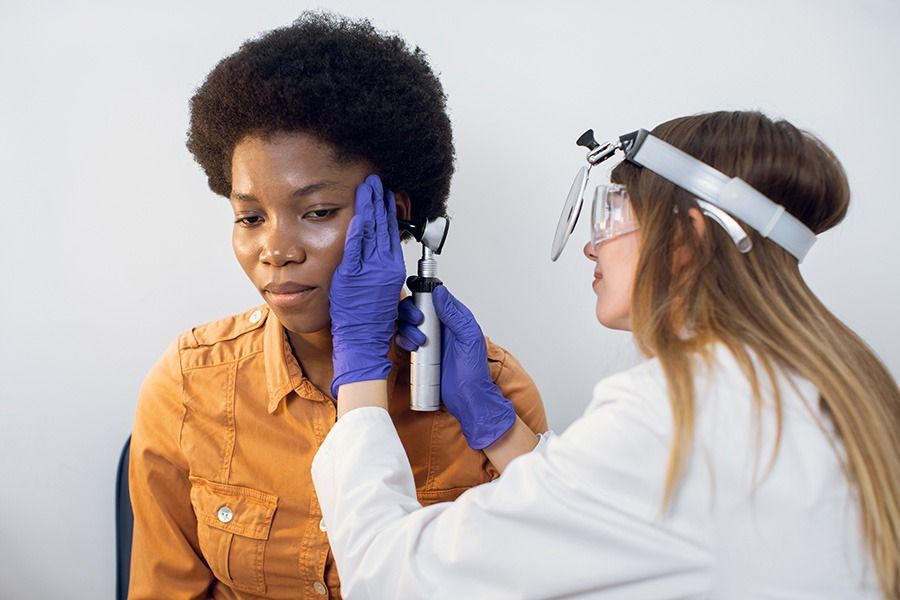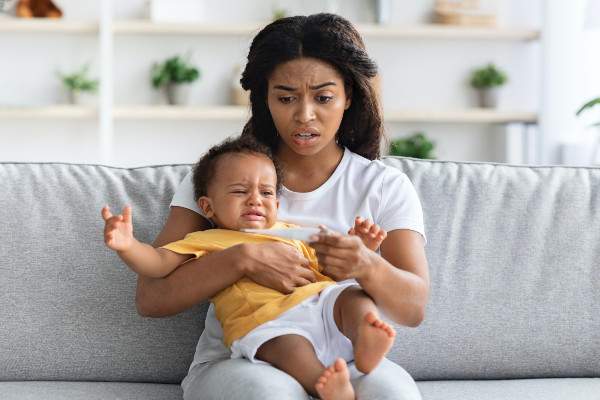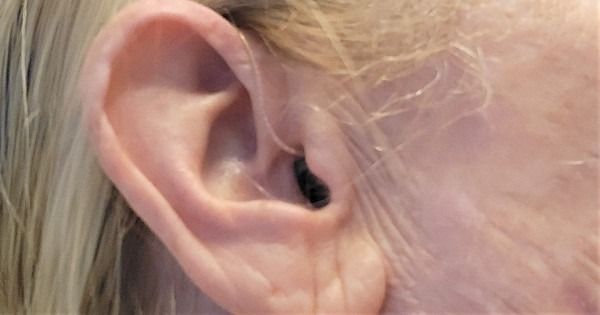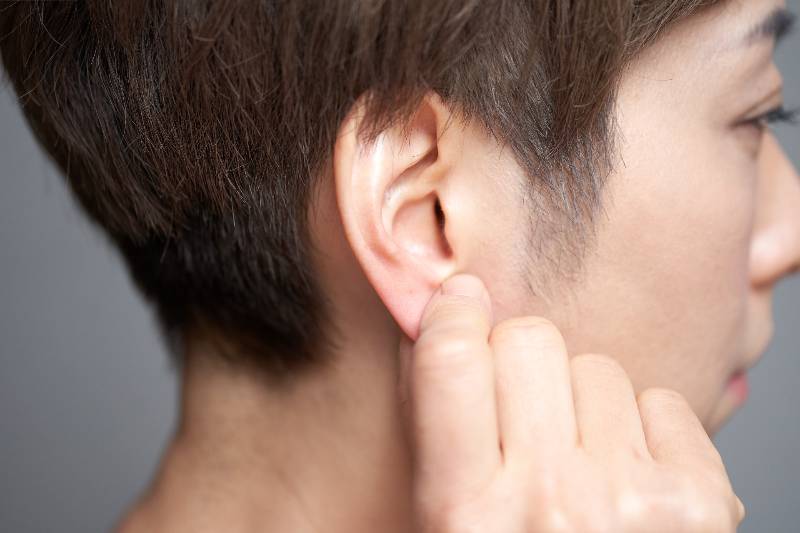Introduction
Facing a new diagnosis can be intimidating, particularly when it involves both meningitis and hearing loss. This all-encompassing guide seeks to empower you with action-oriented tactics and valuable insights to better understand and tackle the road ahead. You will discover an array of current treatment advancements, as well as a variety of coping strategies. The aim is to equip you with the tools and knowledge needed to face the trials associated with meningitis and hearing loss. Let’s delve into the various subjects and methods that can aid you in triumphing over this silent battle.
Meningitis: Understanding Its Potential Impact on Hearing
The role of meningitis in hearing loss can be significant. Meningitis, an infection causing inflammation of the protective membranes covering the brain and spinal cord, can lead to considerable damage to the intricate structures of the inner ear, resulting in different levels of hearing loss. This can span from mild to severe and may involve one or both ears. It’s critical to monitor any hearing changes during and after your recovery from meningitis, as timely detection and treatment can dramatically improve your long-term outlook.
In certain cases, the hearing loss caused by meningitis may be temporary, improving once the infection lessens. But permanent hearing loss can also occur, especially if the injury to the inner ear is substantial. Swift medical intervention and adherence to the treatment prescribed can reduce the risk of irreversible hearing loss. Open lines of communication with your healthcare providers are key to securing the best possible results for your auditory health.
Prevention and Care for Infants with Meningitis and Hearing Loss
Infants are uniquely susceptible to meningitis and its complications, including hearing loss, because of their still-developing immune systems. As a guardian, taking preventative steps is essential to safeguard your infant from the potential auditory impact of meningitis. This involves ensuring they get vaccinations suited to their age, upholding proper hygiene, and promptly seeking medical assistance if an infection is suspected.
Looking after an infant with meningitis and hearing loss can pose a daunting task, but the key lies in being proactive in finding resources and support. Early intervention is crucial for achieving the best possible results. This can mean conducting hearing tests, speech and language therapy, and using assistive technologies like hearing aids or cochlear implants. Through collaboration with healthcare providers, educators, and therapists, you can devise an all-inclusive care plan tailored to your child’s specific needs.
QUIZ - AVAILABLE TREATMENTS FOR TINNITUS
Hurdles of Post-Meningitis Hearing Loss and Ways to Overcome Them
The journey with hearing loss post-meningitis can present a myriad of challenges. However, with the correct strategies and support in place, these hurdles can be tackled effectively. Firstly, establishing a robust support network is essential. This can comprise friends, family, medical professionals, and support groups. Having compassionate and understanding individuals around you can significantly improve your journey towards better auditory communication.
Creating efficient communication methods is another vital step in overcoming hearing loss after meningitis. This might involve learning to lip-read, using sign language, or considering the use of assistive listening devices. Moreover, advocating for your needs can foster a more inclusive and accessible environment. Remember, maintaining a positive outlook and focusing on your strengths can aid in adapting and thriving despite adversity.
Surviving Meningitis-Induced Hearing Loss
Practical Tips and Strategies Managing hearing loss after a meningitis infection can be mentally and emotionally taxing. However, applying useful coping strategies can guide you through this challenging period. A key strategy is educating yourself about hearing loss and the range of treatments and resources at your disposal. Being well-informed enhances your ability to make informed decisions regarding your care and to advocate for your needs.
Staying socially engaged is another crucial coping mechanism. Building and maintaining relationships with friends, family,
and support groups can provide invaluable emotional support and practical guidance. Sharing your experiences and learning from others who have faced similar trials can alleviate feelings of isolation and foster a sense of empowerment.
Prioritizing self-care is another critical aspect of coping with hearing loss following meningitis. This includes focusing on your physical, emotional, and mental health. Engaging in activities you love, practicing relaxation methods, and seeking professional help when necessary can contribute to your overall wellness and resilience.
Professional Re-Chargeable Hearing Aid
Experience Exceptional Sound Quality with Vivtone RIC02, a professional RIC hearing aid featuring a receiver in the canal design. Enjoy superior sound fidelity, reduced distortion, and minimal feedback. With a remarkable 51dB peak sound gain, it surpasses many other devices, catering to a wide range of hearing loss levels.
State-of-the-Art Technology awaits you with Vivtone RIC02. Designed with US-made components from renowned brands like Intricon and Knowles, this advanced device offers exceptional quality at a fraction of the cost. The built-in 30mAh steel-sealed lithium polymer battery charges rapidly in just 1.5 hours and provides an impressive battery life of over 20 hours.
Reliability and Water Resistance come hand in hand with the Vivtone RIC02. Secure your device with the included lanyard and clip, preventing accidental loss. With an IP65 rating, these hearing aids are resistant to water, sweat, and raindrops, assuring longevity and durability. Give the perfect gift to your seniors and loved ones, as this device combines functionality with an appealing appearance and packaging.
Your Guide to Navigating Meningitis and Hearing Loss
Embarking on the journey through meningitis and hearing loss can be daunting, but having a thorough resource guide can make all the difference. A list of credible sources, including websites, books, support groups, and healthcare professionals, can ensure you have access to the most current and reliable information.
Resources such as the Centers for Disease Control and Prevention (CDC), World Health Organization (WHO), American Academy of Audiology, and the Hearing Loss Association of America can be beneficial. These organizations provide valuable information about prevention, diagnosis, treatment, and support for those affected by meningitis and hearing loss. Remember, staying informed and connected is key to effectively managing your condition.
The Path to Improved Hearing Post-Meningitis The journey to improved hearing following meningitis may be filled with obstacles, but with resilience, support, and the right resources, it is possible. Your path may involve various stages, such as consultations with audiologists and other medical professionals, exploration of hearing aids or cochlear implants, and engaging in speech and language therapy.
It’s crucial to be patient with yourself and acknowledge that progress may be slow. Celebrate each milestone, no matter how small, and keep a positive outlook as you progress. By remaining dedicated to your journey and seeking the necessary support, you can ultimately achieve better hearing and a higher quality of life.
Conclusion
In conclusion, navigating the complex landscape of a diagnosis involving both meningitis and hearing loss can initially seem overwhelming. However, armed with a comprehensive understanding of the condition and its potential impact, patients can learn to manage and even overcome the associated challenges. Early detection and intervention, particularly in cases where infants are affected, are pivotal in ensuring the best possible outcomes.
Strategies for coping with hearing loss following meningitis involve creating efficient communication methods, such as lip-reading, sign language, or considering assistive listening devices. Staying socially engaged, maintaining relationships, and sharing experiences with others facing similar challenges can foster a sense of community and empowerment. It’s equally essential to prioritize self-care, focusing on physical, emotional, and mental health to build resilience.
Resource guides provide a crucial aid for those affected, offering access to up-to-date, reliable information from reputable sources such as the CDC, WHO, and other hearing loss organizations. These resources can serve as a lifeline, providing insights on prevention, diagnosis, treatment, and support, empowering individuals to manage their condition effectively.
The path to improved hearing after meningitis can be arduous, but it is achievable with patience, support, and the right resources. Remember, progress may be gradual, but every small achievement brings you closer to better hearing and improved quality of life. Celebrating these milestones can help maintain a positive outlook, fueling the journey towards recovery.
Importantly, the power of resilience cannot be understated. Cultivating a strong support system, prioritizing early intervention, and focusing on self-care are all integral components to overcoming the challenges associated with meningitis and hearing loss. Persistence and resilience form the cornerstone of this journey.
In essence, living with meningitis and hearing loss presents numerous hurdles, but with the right strategies, resources, and mindset, these can be effectively tackled. This guide aims to empower individuals diagnosed with meningitis and hearing loss, providing them with the necessary tools and knowledge to navigate their journey with confidence and resilience. The ultimate goal is to enhance hearing and overall well-being, creating a brighter, more empowered future.

Thriving with Conductive Hearing Loss: A Guide to Hobbies, Fitness, Socialization, and Relationships
This guide offers strategies for seniors caring for someone with conductive hearing loss, focusing on hobbies, fitness, social events, dating, and music.

Navigating the Sound of Silence: Insights into Living with Conductive Hearing Loss
An in-depth look into the lives of seniors with conductive hearing loss, exploring their challenges and the strategies they use to lead fulfilling live








